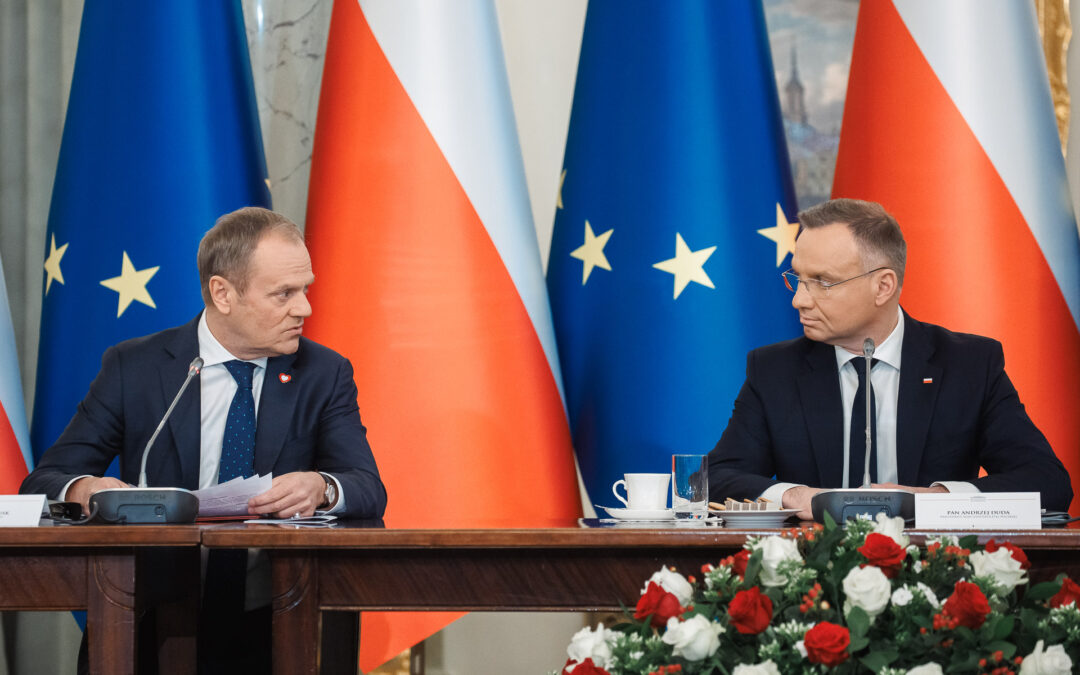President Andrzej Duda has criticised the security services after it emerged that a Russian-Spanish journalist accused of spying for Russia and released last month in a prisoner swap was shown confidential files while in detention in Poland.
The president even suggested that this could have happened because the government of Prime Minister Donald Tusk, which Duda is an opponent of, is cooperating with Russia.
However, prosecutors have insisted that providing detainees with access to files before a trial is standard and legally required procedure. They also say that the spy did not have access to any material that “could harm the interests of Poland”.
Prezydent @AndrzejDuda o sprawie dostępu Pawła Rubcowa do akt:
💬 Za poprzednich rządów Pana @donaldtusk została zawarta umowa pomiędzy SKW a FSB, jeżeli chodzi o współpracę. Premier Donald Tusk wyraził na nią zgodę. Czyżby ta współpraca między służbami rosyjskimi, a służbami…
— Kancelaria Prezydenta (@prezydentpl) September 5, 2024
Pavel Rubtsov – who went by the name Pablo González – was detained in Poland in 2022 then subsequently held in pretrial detention until the end of July this year, when he was sent back to Moscow as part of a large-scale prisoner exchange between Russia and the West.
On Thursday this week, the Rzeczposplita daily reported that shortly before his release, Rubtsov was given access to files relating to the case against him, which included confidential material.
The report prompted criticism from the opposition Law and Justice (PiS) party, who suggested that Poland’s security could have been compromised as a result. On Thursday evening, PiS-aligned President Duda also voiced concern.
Panowie doszli do wniosku, że, jak na agenta, za mało wie o tym o czym powinien wiedzieć !
Paweł Rubcow, agent GRU, przygotowując się do procesu w Polsce, wynajął prawników. Tuż przed wymianą szpiegów prokurator udostępnił mu akta śledztwa, także tajn
— Leon Komornicki (@KomornickiLeon) September 5, 2024
“The situation is all the more bizarre because I think at the time there was no longer any doubt that this gentleman was a Russian agent,” said Duda. The president argued that the authorities should have used regulations allowing them to withhold classified material for security reasons.
Duda also noted how in 2012, under a former Tusk-led government, Poland’s military counterintelligence service had signed an agreement with its Russian counterpart.
“Could it be that this cooperation between the Russian services and the Polish services under Donald Tusk is continuing? Because that’s how it looks,” the president declared.
Sorry to interrupt your reading. The article continues below.

Notes from Poland is run by a small editorial team and published by an independent, non-profit foundation that is funded through donations from our readers. We cannot do what we do without your support.
Polish prosecutors have, however, defended their actions. They note that it is a legal obligation to make files available to a suspect. They also point out that they had not been made aware of the top-secret negotiations that resulted in Rubtsov’s release.
“If a person is charged with an offence, all the evidence gathered is made available [to them] in a categorical manner before an indictment is formulated,” Dariusz Korneluk, the national prosecutor, told broadcaster TVN.
Korneluk stressed that in the files handed over to Rubtsov – including the classified ones – “there are no names, no findings and no circumstances that could harm the interests of Poland”.
Co Paweł Rubcow zobaczył w aktach, a czego nie? Prokurator Krajowy Dariusz Korneluk odpowiada w @KropkaNadI.
Zobacz rozmowę w TVN24 GO
🔗 https://t.co/13vGh4TojX pic.twitter.com/noASwh1y3f— tvn24 (@tvn24) September 5, 2024
The minister in charge of the security services, Tomasz Siemoniak, likewise told TVN that providing access to files before trial is a “natural thing”. He also added that he did “not want to believe that [the president] could say something like this”.
Prosecutors have “said very clearly that these suggestions that any national security secrets could have been learned and taken away, that such a thing did not happen and that he simply did not learn any security secrets”, added Siemoniak.
Shortly after his return to Moscow, Rubtsov was indicted by Polish prosecutors, meaning he should in theory face trial, though that appears certain not to happen. Meanwhile, his former partner, a Polish journalist, has also been charged with abetting his actions.
Polish prosecutors have issued an indictment against the Russian-Spanish journalist detained in 2022 on suspicion of spying for Moscow.
However, given that he was returned to Russia as part of the prisoner exchange, he seems certain not to face trial https://t.co/XSJL6yec79
— Notes from Poland 🇵🇱 (@notesfrompoland) August 15, 2024
Main image credit: KPRM (under CC BY 3.0 PL)

Agata Pyka is a former assistant editor at Notes from Poland. She specialises in Central and Eastern European affairs, cybersecurity, and investigative reporting. She holds a master’s degree in political communication from the University of Amsterdam, and her work has appeared in Euractiv, the Balkan Investigative Reporting Network (BIRN), and The European Correspondent, among others.



















